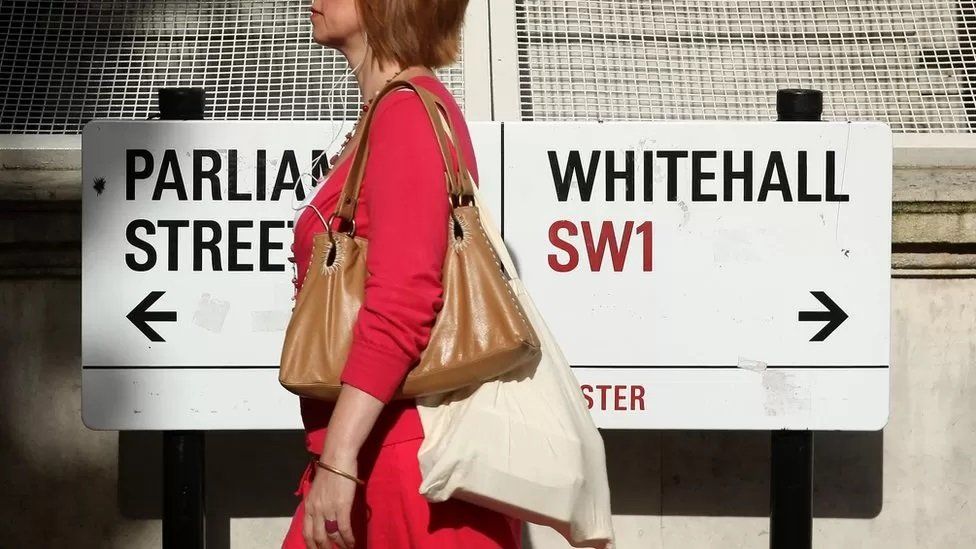ARTICLE AD BOX
 Image source, PA Media
Image source, PA Media
Proposals to reform Whitehall have been met with eye rolling, disengagement and aversion tactics by top civil servants, a new report was told.
Resistance to change from within is one of the key barriers to making the civil service more efficient, the think tank Reform reported.
But a civil service union told the BBC "reform needs to be strategic" and "too often it is a knee-jerk reaction".
A government spokesperson said its new reform programme is making progress.
They added: "Ministers and permanent secretaries have launched a wide ranging programme of reform across the civil service which is driving progress across all departments."
The think tank report states there is a "remarkable consensus" across the political parties on the need for reform of the civil service.
Successive governments are said to have been frustrated with a lack of dynamism, skill shortages, risk aversion, reliance on established processes, and high staff turnover in the government machine.
Ministers have long complained about their attempts to shake-up the civil service, to improve the delivery of policies, being frustrated.
Some Tory MPs have angered civil servants by referring to them as the blob . In March, an email sent in Home Secretary Suella Braverman's name suggested civil servants were deliberately trying to stop policies they opposed.
The Reform report claims that permanent secretaries, the most senior civil servants in government departments, are not interested in reform.
The report is based on interviews with 27 former cabinet secretaries, permanent secretaries, cabinet ministers and special advisors.
It says one of the most common phrases given by interviewees when asked how civil service leaders responded to government proposals for change was "eye rolling".
One former permanent secretary said: "When the Cabinet Office tries to reform departments, there is quite a bit of eye rolling about the latest initiative to come out of the centre."
Other senior civil servants admitted that they tended to "switch off" when people spoke about the latest government initiative.
An ex-senior adviser recalled being sent a document about a reform agenda and a permanent sectary ordering them to "just bin it immediately".
Image source, Getty Images
But some interviewees said it was the support of senior politicians, in particular the prime minister, cabinet ministers and the Treasury, that determined the success of civil service reform.
A former senior civil servant said: "If No.10, the Cabinet Office and the Treasury want it to happen it will, and if either No.10, the Cabinet Office or the Treasury don't want it to happen, it won't."
In a preface to the report, former Cabinet Secretary Sir Mark Sedwill, however, explained it is hard to drive reform from the centre.
Sir Mark said sometimes he felt he had less power as cabinet secretary - the UK's top civil servant, who oversees all departments, than as permanent secretary at the Home Office.
"At the Home Office, I'd sometimes find I'd pulled levers and commissioned work, even if I didn't know I had, just by casual remarks," he said.
"[As] cabinet secretary, I could barely find a lever that was connected to anything."
'Knee-jerk reactions'
Responding to the report, a government spokesperson said: "The civil service continues to work tirelessly to deliver for the British people and level up our country."
The government's recent civil service reform plan was launched in June 2021.
As part of the plan, there had been £8bn investment in new technology and 12,000 civil service jobs had been moved out of London, the government's spokesperson said.
Meanwhile, Amy Leversidge, from the FDA, a trade union representing senior and middle management civil servants, said: "No organisation can remain static and still be fit for purpose.
"But reform needs to be strategic and offer a solution to a genuine problem, it needs to add value and fundamentally must be achievable.
"Too often we see knee-jerk reactions dressed up as reform programmes."
Ms Leversidge said one of the biggest levers departments have for delivering reform is pay.
"The civil service's pay structure is broken, and the FDA wants to work with the Cabinet Office to develop a better and more strategic pay system so the civil service can continually ensure that it has the right skills, talent and knowledge to deliver our public services," she told the BBC.
External expertise
One solution to the lack of support from permanent secretaries for reform is to recruit more civil service leaders externally, the report suggested.
"Typically, people who have spent their entire career in something don't want to change things," one ex-permanent secretary said.
"It's always easier to see opportunities for reform when you haven't spent your career in one place", they explained.
The report concluded that bringing in external expertise to the civil service could break the cycle and open doors for reform.

 1 year ago
39
1 year ago
39








 English (US) ·
English (US) ·